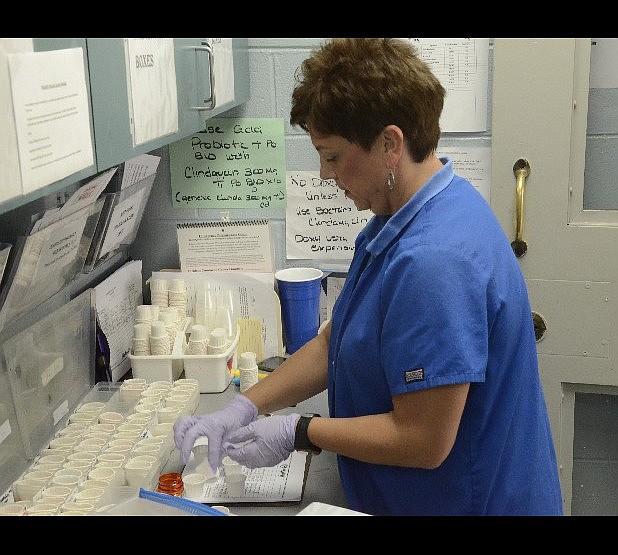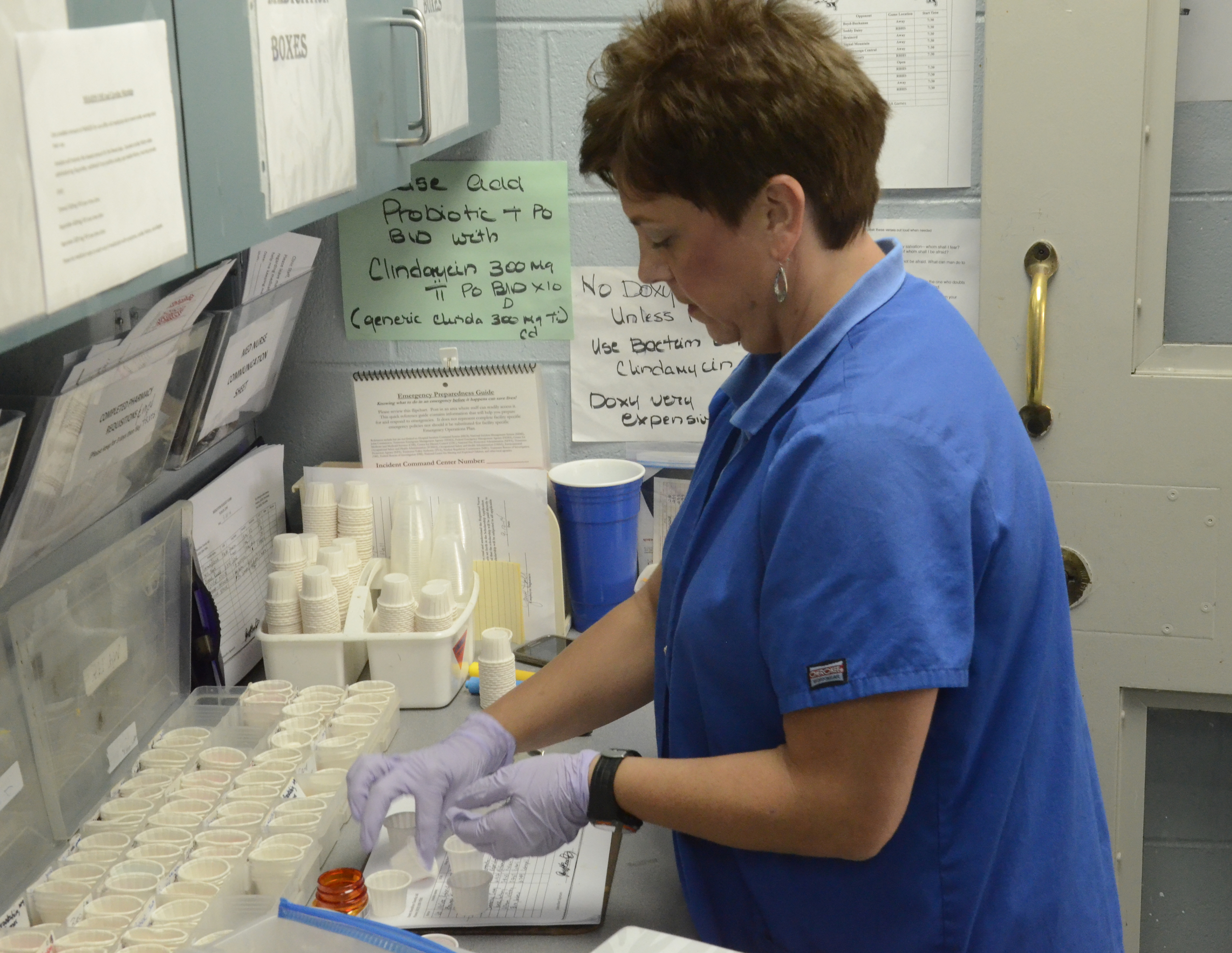Every day in a small room on the second floor of the Hamilton County Jail, nurse Janet Hall sorts pills into little paper souffle cups.
She counts them, one by one: Pills for blood pressure, pills for heart disease and, in hundreds of cups, pills for mental illness.
Forty percent of the roughly 500 inmates in the Hamilton County Jail need psychotropic medication. They hold out their hands, once in the morning and once in the evening, for pills that will help ease the symptoms of bipolar disorder, depression, anxiety and - for 10 percent of the jail population - schizophrenia.
The psych meds, and the $68,800 the county spent on them last year alone, are just one reflection of how the Hamilton County Jail and its sister facility CCA Silverdale have turned from criminal justice centers to default mental health institutions.
The problem continues to worsen, despite publicity and mounting outrage across the nation as state mental health hospitals are shuttered.
"We see the same people over and over and over," said Linda Graham, the mental health coordinator for the private Corrections Corporation of America, who also works part time at the jail. "Sometimes the same people every two to three months."
But for the first time in years, Graham and other health workers at the Hamilton County Jail are starting to feel a glimmer of hope.
Plans for a mental health court, long a dream in this community, finally are gaining traction. Advocates say they hope to see one in place as early as next year.
"We are still working out details, but we have a large group of people across the community working hard to launch it in the near future," said Anna Protano-Biggs, an assistant public defender who has been helping to coordinate the effort.
Last winter, a Hamilton County grand jury called for the creation of a mental health court, and other local grand juries since have followed suit.
"The need to have such a court is very clear," the most recent grand jury's report read. "We feel it would serve to break the cycle of arrest to those who are suffering with such an illness, as well as being a savings to the taxpayer."
Such a court could help ease overcrowding in the jails by keeping offenders with mental health concerns out. It would provide alternative sentencing, mental health support, and close monitoring of each defendant's case.
This spring, the county public defender's office put together a committee of more than 30 people - judges, attorneys, mental health advocates and law enforcement officers - to develop an action plan. They now meet regularly.
While past attempts to start such a court have fizzled, Graham and other advocates say there is more momentum now. There is strong buy-in from local judges, and area health providers are on board.
Families with loved ones in the legal system are impatient to see the court take shape.
Parents of Aaron Roden, the 22-year-old charged with causing $60,000 in damage at Westview Elementary School in August, have said their son needs care that the jail can't provide. They wonder if he could be a candidate for the court.
At a hearing last week, Michael Roden said he doesn't think his son's condition will improve as long as he's in the general population.
"They're good people, and they're doing the best they can, but their resources are limited," Roden said.
•••
It's not yet clear exactly what a mental health court might look like in Hamilton County.
An obvious parallel is the well-established drug court, which involves a regimen of treatment programs, screenings and progress checks.
The new model also likely will borrow ideas from Nashville, where Davidson County's program is run out of Sessions Court.
Only offenders who are nonviolent and receptive to treatment will qualify. Once qualifications are met, the next step is to take stock of the defendants' needs - housing, food, medicine or transportation - and piece together an individual plan to help create enough stability for them to follow the judge's orders, said Donna Maddox, a committee member and director of Joe Johnson Mental Health Services.
If the person needs a caseworker, liaisons will apply for funding to help pay for one. If there is no housing or rental assistance available, caseworkers must ensure the person finds a secure shelter.
Once a release plan is set up, local providers will step in, likely sharing the load. The idea hinges on greater collaboration among outside providers, the court and the defendant.
"It will be our role to make sure they are linked to mental health services, and to keep track of their compliance," Maddox said. "The judges will be looking to the mental health community to understand those dynamics."
Once in the program, candidates for the court would be eligible for reduced or alternative sentences, and their cases would be monitored by the same judge in sessions or criminal court.
That face-to-face contact is meant to increase accountability for offenders with mental health concerns.
Criminal Court Judge Don Poole said the intersection of mental health and crime didn't become glaringly obvious to him until he took the bench.
"The people who come before you very evidently have problems," Poole said.
Poole is one of several Hamilton County justices actively involved with the new court's planning committee.
"It has been a need for a long time, and it's been a concern for a long time," Judge Barry Steelman said.
Though it's not clear which specific judge will handle cases in any court, Steelman said the committee is hoping criminal, sessions and municipal courts all will be involved in working mental health court cases through the system.
Right now the committee has no county funding for such a court, though it is pursuing grants. But its members do not want to have to wait for funding.
If it comes down to it, Protano-Biggs says, they will try to start with what they have now.
•••
Even if a new court is up and running within a year, systemic problems with the community's access to mental health care will remain unsolved.
The shrinking number of beds at state mental health hospitals such as Moccasin Bend means that it can take days or weeks for a space to open for a patient evaluation or more serious treatment.
Gayle Lodato, senior director at the behavioral health care provider Helen Ross McNabb Center, said she has seen patients spend two days in the emergency room waiting for a bed in the area to open.
At Roden's most recent hearing for his vandalism charges, General Sessions Judge Gary Starnes expressed frustration that more than a month after his arrest date, Roden still hadn't been forensically evaluated by Moccasin Bend or Joe Johnson.
State officials say the typical time frame to have such an evaluation is usually about six weeks, and that this is a "well-established time frame" to remain flexible for emergency admission cases.
But the number of those evaluations Moccasin Bend handles has nearly doubled since 2012, when Knoxville's Lakeshore Mental Health Institute shut its doors.
Moccasin Bend now serves a 52-county region - more than half of the state, said Mike Machek, spokesman for the Tennessee Department of Mental Health and Substance Abuse Services.
Because of this, the number of court-ordered evaluations handled by Moccasin Bend has grown from 60 to an average of 103 each year.
Those bottlenecks, Hamilton County Jail Chief Joe Fowler said, mean the jail will continue to catch the overflow of unmet mental health needs.
"That's the horrible reality," he said.
Fowler said he and the medical staff at the jail are trying to come up with better systems for meeting this population's needs.
He plans to install a computer system at the jail that will flag repeat inmates who have mental health conditions. He is appealing for funding to make the jail's part-time mental health coordinator a full-time job.
But even as Fowler works to make the jail more compatible for people with mental illnesses, such an effort seems illogical.
"We aren't supposed to be the place where these people get help," he said. "At the end of the day, we are still a jail."
Contact staff writer Kate Harrison Belz at kbelz@timesfreepress.com or 423-757-6673.
Contact staff writer Claire Wiseman at cwiseman@timesfreepress.com or 423-757-6347.


